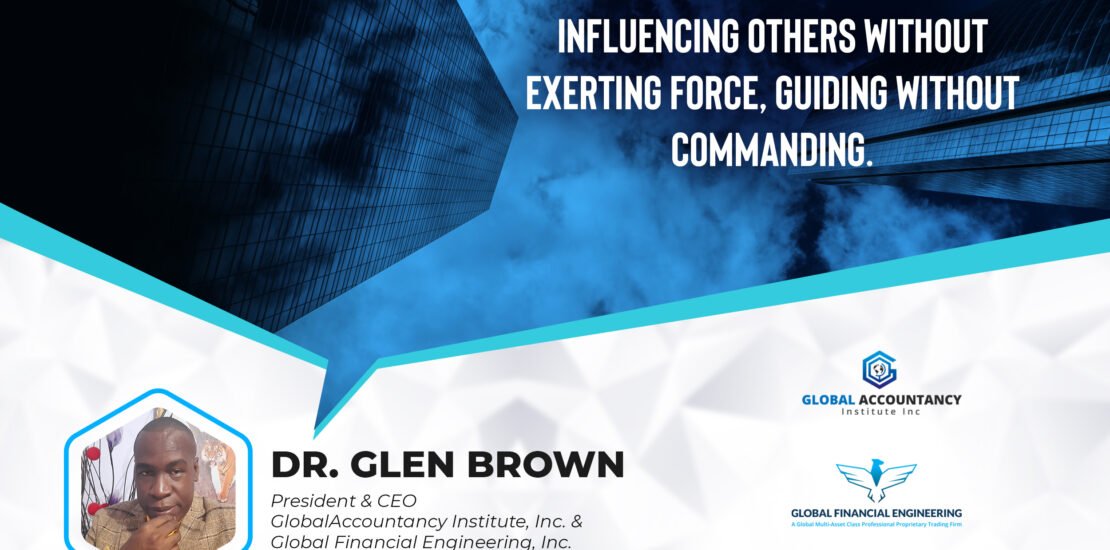The Future of Finance: Why We Trade with the Market, Not Against It
- April 11, 2024
- Posted by: Drglenbrown1
- Category: Financial Innovation

Introduction
In the fast-paced world of finance, traditional models of customer interaction are evolving. At Global Accountancy Institute, Inc., and Global Financial Engineering, Inc., we have adopted a forward-thinking approach that sets us apart: the market itself is our primary customer. This article explores the philosophical underpinnings and strategic advantages of this innovative model, demonstrating how it enhances our agility, control, and synchronicity with market dynamics.
Philosophical Foundations
Our approach is rooted in a deep understanding of market forces and the belief that the most sustainable way to generate profits is by moving with the market rather than opposing it. This philosophy is driven by the notion that markets, though seemingly chaotic, follow underlying patterns and trends that can be harnessed through sophisticated trading strategies and advanced technological tools.
Strategic Agility
By treating the market as our customer, we eliminate the traditional barriers and delays that come with client-based operations. This allows for a more agile response to market conditions, as we are not bound by external client needs or restrictions. Our trading decisions are made based on real-time data and predictive analytics, giving us the ability to swiftly adapt to sudden market shifts.
Control Over Trading Decisions
This model affords us complete control over our trading strategies. Without the need to conform to the specific risk profiles or investment preferences of external clients, we can optimize our trading algorithms to pursue the most promising opportunities as they arise. This level of control is crucial in maintaining high performance standards and achieving superior returns on investments.
Alignment with Market Dynamics
Direct engagement with the markets ensures that our trading activities are always aligned with current market dynamics. This alignment is critical in proprietary trading, where success depends on accurately anticipating market movements. Our strategies are designed to flow with these movements, capitalizing on trends and making adjustments based on continuous market analysis.
Benefits of Market-Centric Trading
The benefits of this approach are manifold:
- Enhanced Flexibility: We can enter and exit trades without the typical constraints imposed by client agreements, allowing for optimal trading flexibility.
- Reduced Costs: By not having to manage client relationships, we lower our operational costs, which can translate into higher net returns.
- Greater Profit Potential: Free from external pressures, our strategies can fully exploit market inefficiencies and volatility for maximum profit.
The Technological Edge
At the core of our strategy is the Global Algorithmic Trading Software (GATS), which embodies our commitment to technological innovation. GATS enables automated trading across multiple asset classes, using real-time data to drive decisions that capitalize on market trends and anomalies.
Conclusion
The decision to treat the market as our customer is a testament to our belief in the power of technology and strategic innovation in the world of finance. As we continue to refine our algorithms and expand our trading capacities, we remain committed to this path, confident in its potential to reshape the financial landscape and set new benchmarks for success in proprietary trading.
About the Author
Dr. Glen Brown is the visionary behind the unique market-centric trading philosophy at Global Accountancy Institute, Inc., and Global Financial Engineering, Inc. His leadership and innovative approach have been pivotal in redefining the boundaries of proprietary trading.
Call to Action
Explore how aligning with market dynamics can revolutionize your trading approach. Visit our website to learn more about our innovative strategies and how we harness the power of the market to our advantage.
General Disclaimer
The insights shared in this article are based on our proprietary trading experiences and are intended for informational purposes only. They should not be considered financial advice.
